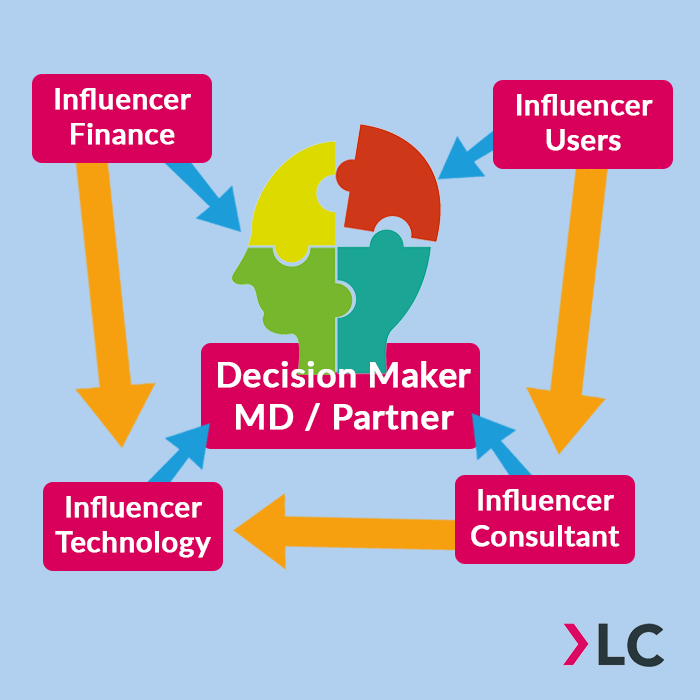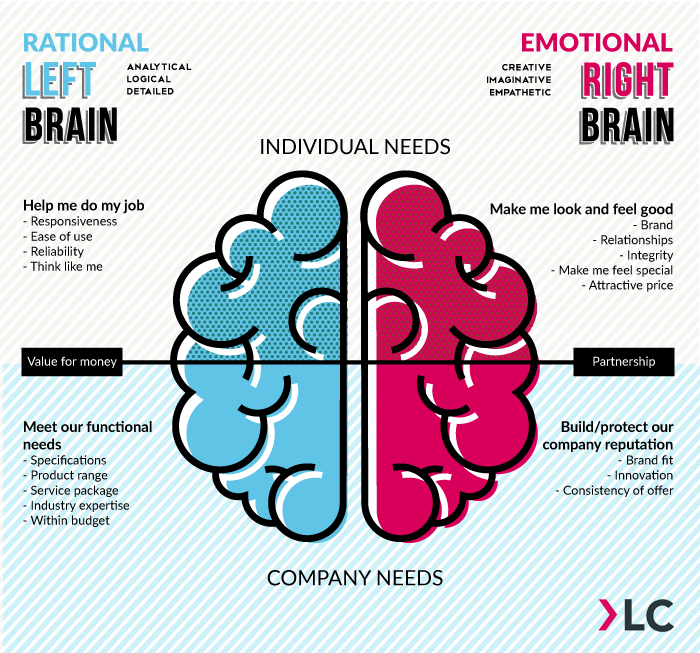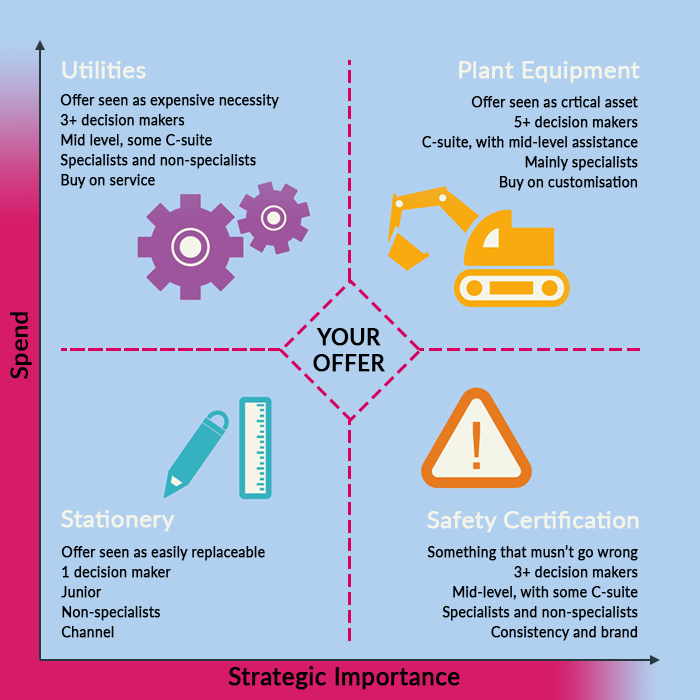
A DMU in marketing terms is the decision-making unit. It is most relevant in business to business (B2B) marketing and sales situations.
In this post we are going to look at why the concept of a DMU is so important in B2B marketing and how you can use it effectively.
Why is it important to understand the concept of a DMU in B2B marketing?
In a typical B2B purchase of any significance, there is likely to be a more complex decision-making unit. In simple terms we need to communicate more details to more people, each of who have potentially different information needs. In the B2C environment, the decision-making process and unit is typically quite simple, consisting most typically of an individual, a couple or family unit.
In the B2B environment at its simplest the decision maker will need to justify their decision to superiors or subordinates. Beyond this there can be any number of other stakeholders in the B2B landscape and in larger organisations there will be procurement departments and a group purchasing policy to consider.
As a result, the B2B marketer has a complex communication landscape in which they need to work.
What does a typical DMU look like?
Philip Kotler a marketing professor and author on various books defined 6 key roles in a typical decision making unit.
It is important to remember that one individual can hold several roles. The 6 key roles are:
- Initiator
- Coordinator (Gatekeeper)
- Buyer
- Decision maker
- Influencer
- User
These roles work in most cases. The best advice is to research and understand your market to identify the typical DMU that applies and create a model that works for your market.

All roles will need to be aware of your product or service benefits and the details relevant to their role. It is safe to say that wherever they appear in the influence matrix, from simple user to final decision maker, there are some common facts that each will need. Key facts for all decision makers are:
- Provable product or service differentiators
- Quantifiable benefits
- Price
Timing is everything in B2B marketing
We must also remember that timing is a critical consideration for all B2B marketers. Many needs for B2B products and services are irregular. Take a large capital investment such as a phone system or 3D printer that may only require replacement on a certain buying cycle - a key requirement of the whole marketing communication process, is to gather information that will have no short-term use, however its availability and use at the right time will prove profitable. This means that not all B2B marketing communication will be aimed directly at a sale or an appointment, but rather at information gathering.
While timing is unlikely to affect the DMU directly, the type of purchase is a significant influencer on the make up of the DMU.
The impact of spend and strategic importance on the decision making unit in B2B marketing
Understanding the buying situations
In addition to the type of purchase outlined above, there are three common buying situations that also influence the decision making process.
Straight rebuy
This is a routine repurchase, where the goods or services have been purchased before from an established supplier.
Impact on the DMU
This situation tends to mean a much lighter decision making process takes place, making the decision-making unit simpler. It is highly unlikely that a new decision making unit will need to be created and in all probability there will be fewer people required within it.
Modified rebuy
In this situation a small number of components are new in the purchase process. These could be additions to a service, a new product or a new supplier.
Impact on the DMU
If the complexity is low, it is unlikely that a new or modified decision making unit will be required. However if the modified elements are more complex a new DMU may be created.
New buy
Both the product or service and the supplier are new.
Impact on the DMU
No DMU exists, meaning a new DMU will be required.
Decision making motivations and needs
When understanding the typical DMU for your products and services it is also important to understand the decision making motivations and needs for each of the roles.
Decision making in a B2B sale has two key elements – the individual needs and the company needs - that need to be understood from the perspective of each role. These two key elements will be affected by the rational and emotional decision making process of each of the individuals. Rational decision making is regularly referred to as left brain thinking, while emotional decision making is referred to as right brain thinking.

Rational and emotional motivations at an individual level
Rational individual motivations (Left brain)
When at work we want to do our jobs as effectively as possible. Even the poorest of employee will want to at least reach meet the minimum standard defined by the company and customers. This impacts every decision made in the work environment. “How will this help me do my job?” – is the question found at the root of many of the other individual rational motivation questions.
As marketers looking at B2B decision-making, we need to understand the questions and concerns going through decision makers’ heads. Questions like:
- If they are late – will it be me working late to get this done?
- If they aren’t proactive, will I have to waste my time chasing them?
- If they don’t deliver, will it be on me?
These needs are often not clearly communicated, but impact hugely on all business decisions. It is these reasons that make B2B buyers risk averse. They are not spending their own money, making their time and reputation the main currency in the decision from their individual perspective.
Emotional individual motivations (Right brain)
Individual emotional motivations are the hardest of all to quantify. Each person differs from the next in regards to their personal emotional needs. However, there are a couple of elements that will be consistent for many individuals in the work environment.
These are - "Will it make me feel good?" and "Will it make me look good in front of others?"
Feeling good – elicits the questions like:
- Why should I use that supplier when they don’t seem interested in me?
- Is this brand my sort of company?
Looking good in front of others and personal reputation will usually make the individual ask – “Why should I try a new supplier if I risk looking like an idiot in front of my boss?”
Rational and emotional motivations at a company level
Rational company motivations (Left brain)
These are the company level functional needs of the purchase. They tend to be clearly defined in requests for proposals (RFPs), and the first elements that are listed when a potential supplier asks, “What are you looking for?”
These are the needs that have to be met for a supplier to be considered.
Where all suppliers meet the criteria there is likely to be varying degrees to which they are met. In terms of their influence on the final decision, how well the criteria are met tends to have the most influence in purchases that are high spend and of low strategic importance - purchases where price is a key focus.
Emotional company motivations (Right brain)
It could be argued that companies don’t have emotions, only the individuals within them. However, companies hold values that determine the behaviours and needs of those within it. In modern companies it is the brand that is the most significant asset and it is this asset around which decisions are made. Companies want to deal with other companies that share their culture and characteristics. The desire for ‘brand fit’ is the expression of a company’s emotions.
Crafting messages for different the roles in the DMU
Crafting powerful B2B marketing messages isn’t easy – as the message needs to resonate with the different needs of a group of individuals as well as at a wider company level.
This is why it is so important to map out the typical DMU that will engage in making decisions on the product or service that you are marketing. You’ll also need to understand your typical customer journey, so that your message can adapt to changes in the DMU depending on where the customer is in their journey.
Using the examples above you can define the type of purchase your product or service represents. This along with developing an understanding of the typical decision-making unit (DMU) of prospects allows you to create relevant marketing messages for the different roles within the unit.
Audience intelligence building is an essential part of B2B marketing. It is achieved through the development of a database of potential prospects and leads, their position in the decision-making unit (DMU) and the organisation’s position on the buying journey. This all allows the presentation of the right message, to the right person at the right time, which is the ultimate goal of any marketer.
Understanding the typical DMU of your target audience is therefore an essential part of any B2B marketing strategy. You have to understand before you can truly influence.
Next steps
If you haven't already created target audience personas for your business, this is a great place to start. Identify the key roles in your typical DMU and create a persona for each. You can use our free persona template linked to below, to get you started.
This post was originally published in October 2014 and has been recently revised with further information on the Decision Making Unit in B2B marketing.




